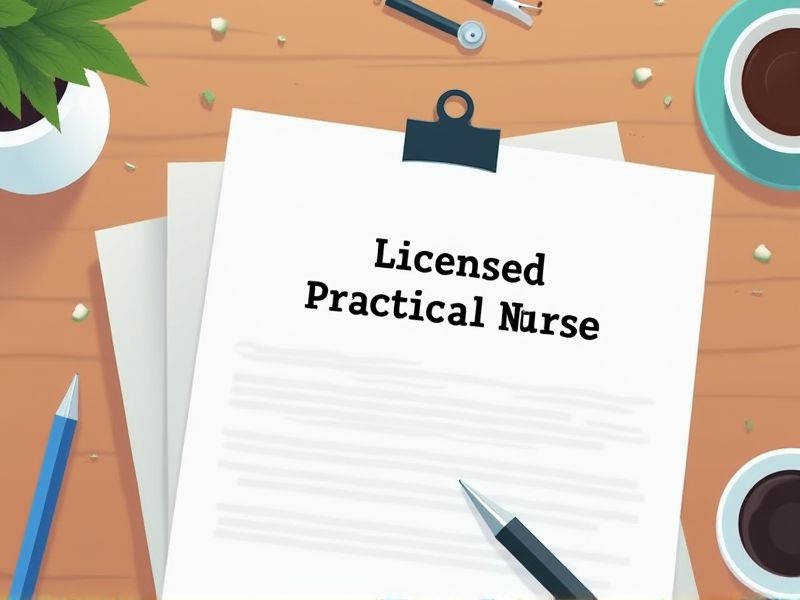
Licensed Practical Nurses (LPNs) require certain certifications to enhance their clinical competencies and ensure patient safety. These certifications validate specialized skills, enabling LPNs to perform tasks such as administering medications or wound care. Regulatory agencies and healthcare employers demand documented proof of such skills to adhere to industry standards and improve care delivery. Some important certifications you may need for a Licensed Practical Nurse include Basic Life Support (BLS) and IV Therapy certification.
National Council Licensure Examination for Practical Nurses (NCLEX-PN)
The NCLEX-PN ensures that all Licensed Practical Nurses meet the standardized criteria necessary for safe and effective practice. Since healthcare environments present complex challenges, the exam evaluates a nurse's ability to apply knowledge in real-world settings. Requiring this exam helps maintain public safety by verifying the competence of newly graduated nurses. Licensing through the NCLEX-PN enables consistent professional qualifications across different states, enhancing the mobility and credibility of LPNs.
Basic Life Support (BLS) Certification
Basic Life Support (BLS) certification equips Licensed Practical Nurses (LPNs) with essential skills in CPR, ensuring they can respond effectively in cardiac and respiratory emergencies. Having BLS certification increases an LPN's ability to significantly improve patient survival rates during critical situations. Employers often require LPNs to be BLS-certified to ensure they maintain a standard of care for patient safety. The certification strengthens an LPN's proficiency in handling emergencies, contributing to enhanced overall healthcare delivery.
Cardiopulmonary Resuscitation (CPR) Certification
Licensed Practical Nurses (LPNs) frequently encounter situations where patients experience cardiac or respiratory arrest. Possessing CPR certification equips them with the skills necessary to perform life-saving measures effectively. Many healthcare facilities mandate CPR certification as part of compliance with safety and accreditation standards. This certification enhances an LPN's ability to react swiftly and confidently in emergencies, thereby increasing patient survival rates.
Intravenous (IV) Therapy Certification
Intravenous (IV) therapy certification enhances a Licensed Practical Nurse's (LPN) capability to administer medications and fluids directly into a patient's bloodstream, increasing the speed and efficiency of treatment. Hospitals and healthcare facilities often require this certification to ensure that LPNs have the necessary skills and knowledge to safely perform IV procedures, reducing the risk of complications. Certification can lead to better job opportunities and career advancement as it differentiates LPNs in a competitive job market. There is a growing demand for proficient LPNs in administering IV therapy due to the increasing prevalence of chronic diseases requiring complex medication regimens.
Wound Care Certification
Wound care certification for a Licensed Practical Nurse (LPN) enhances their skill set, enabling them to assess and treat complex wounds more effectively. As healthcare demands rise, certified LPNs contribute to improved patient outcomes by applying advanced wound management techniques. Certification often leads to increased job opportunities and potential for higher wages, as specialized skills are highly valued in medical settings. Hospitals and healthcare facilities benefit from employing certified LPNs by reducing the incidence of non-compliance and improving care standards.
Medication Administration Certification
Medication Administration Certification is essential for Licensed Practical Nurses (LPNs) because it ensures they have the necessary competence to safely handle and administer medications. This certification helps minimize the risk of medication errors, which can lead to severe patient outcomes. Employers often require this certification as it aligns with regulatory standards and enhances the credibility of the healthcare facility. Holding this certification can also expand LPNs' job responsibilities and opportunities, contributing to career advancement.
Geriatric Nursing Certification
The aging population leads to a growing demand for specialized care, which Geriatric Nursing Certification addresses. This certification equips Licensed Practical Nurses (LPNs) with skills specific to elderly care, enhancing patient outcomes. Employers often seek certified professionals, thus improving job prospects for LPNs. Specialized credentials can lead to increased earning potential, recognizing the advanced expertise in geriatric nursing.
Home Health Care Certification
Home Health Care Certification for a Licensed Practical Nurse (LPN) enhances their skill set for providing specialized care in home settings. Through certification, LPNs gain the necessary knowledge to address unique challenges patients face at home. Certification often leads to improved patient outcomes because the care provided is informed by up-to-date clinical guidelines. For LPNs, certification can also result in better job opportunities and potentially higher wages.
Phlebotomy Technician Certification
Phlebotomy Technician Certification enhances the skill set of Licensed Practical Nurses (LPNs), improving their capability to perform blood draws with precision. Hospitals and clinics often require this certification as it reduces the risk of error and promotes patient safety. Certification provides LPNs with a competitive edge, increasing job prospects and potential earnings. Many states and healthcare facilities mandate this additional certification to comply with regulatory standards and ensure consistent quality of care.
Infection Control Certification
Infection Control Certification ensures Licensed Practical Nurses (LPNs) possess up-to-date knowledge on preventing healthcare-associated infections, reducing patient risk. This certification equips LPNs with standardized procedures, leading to consistent and effective infection prevention practices. Facilities with certified LPNs often experience lower infection rates, enhancing overall patient safety and trust in the healthcare system. Employers may prefer certified LPNs, as their skills can contribute to improved healthcare outcomes and compliance with health regulations.
Summary
Gaining certifications as a Licensed Practical Nurse enhances your skill set, leading to increased job opportunities in specialized areas such as gerontology or IV therapy. With specialized knowledge, you become eligible for higher salaries, contributing to improved financial stability. Certification also boosts your professional credibility, often resulting in greater trust from both employers and patients. As a certified LPN, you experience job satisfaction from a more impactful role in patient care.
